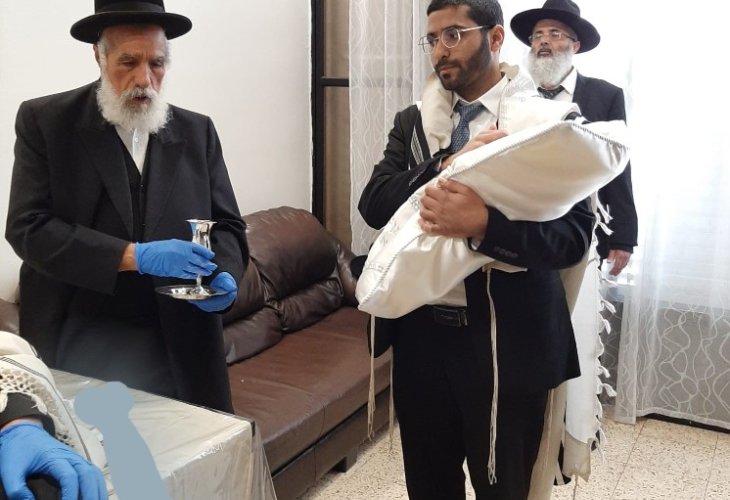Rabbi Mohapud Warns: "People Are Cancelling Brit Milahs Due to Coronavirus"
Why are some people choosing to cancel brit milah ceremonies because of COVID-19? What should be done if the infant is infected, and what if the father can't attend? Mohel Rabbi Shlomo Mohapud answers these pressing questions.
 Rabbi Shlomo Mahpoud (Credit: Rabbi Yehuda Mahpoud)
Rabbi Shlomo Mahpoud (Credit: Rabbi Yehuda Mahpoud)"The coronavirus crisis has led secular Jews to decide to cancel their children's brit milahs," says Mohel Rabbi Shlomo Mohapud, head of the Kashrut Authority of Badatz Yoreh Deah and Rabbi of Neve Achi'ezer and Shikun V' in Bnei Brak, with pain. "Do you understand what that means?" he adds sorrowfully. "This is a mitzvah foundational to the Jewish people, all of Judaism is built upon it; it unites us with Hashem, so how can it be canceled?"
Rabbi Mohapud adds, "The public needs to understand that the mitzvah of brit milah can be performed with just two people; a quorum is not necessary. As the Midrash says, 'Marriage with ten, brit with two.' Yes, ideally, we prefer a quorum and celebrate with a large event, but during these times, we must not forgo the brit on its appointed time."
However, Rabbi Mohapud emphasizes: "Even at brit ceremonies, we must follow the Health Ministry's guidelines, without exceptions. We must adhere to limits on the number of people, hand-washing, and maintaining a safe distance; this concerns saving lives."
 (Credit: Rabbi Yehuda Mahpoud)
(Credit: Rabbi Yehuda Mahpoud)
Isolation and Halacha
What happens if the father is in isolation? Can the brit be postponed?
"No, absolutely not. It's severely forbidden. No disaster will occur if the father isn't at the brit. The brit must happen as scheduled, just like in unfortunate cases where there's no father."
I attempt to make it easier for the father and ask Rabbi Mohapud if the father could recite the blessings for "inserting him" and "shehecheyanu" digitally via mobile phone with today's technology.
"I'm not comfortable with that," replies the rabbi. "Aside from issues with blessings transmitted through the airwaves, a brit also involves the joy of the mitzvah that requires blessing, and here, the father isn't present."
And what about an infant diagnosed with COVID-19? Recently, there was news about a mother at Laniado Hospital who got sick, and it's possible her newborn also contracted it. How can a brit take place in such circumstances?
"I'm aware of the case," clarifies Rabbi Mohapud. "I know they isolated the baby from the mother, placing him in a two-week quarantine. In this scenario, it is indeed impossible to circumcise the baby on the eighth day; it might endanger him. Therefore, we have no choice but to wait two weeks. Only after testing negative can the brit proceed."
Usually, there is a grandparent who takes on the role of sandek. How would you suggest handling this matter?
"Personally, I'd advise all elderly individuals not to take risks and to stay home, even for important events like their grandchild's brit or being sandek," he responds. "If a grandparent insists, it's crucial that they wear a mask and gloves to protect themselves, as life is invaluable."
During the conversation with Rabbi Mohapud, his grandson, Rabbi Yehuda Mohapud, standing by his side, wishes to highlight an important point: "Based on what we know, a circumcised infant doesn't fall into the COVID-19 risk category, so concerned parents can set their fears aside."
Additionally, Rabbi Yehuda notes, "Unlike a brit milah, there's an event called 'Brita,' a party for the birth of a girl. It's imperative to postpone such celebrations, as they aren't rooted in halacha and can easily wait until the situation normalizes. We hope and pray that Hashem will remove all illness, and grant us good health speedily in our days, amen."

